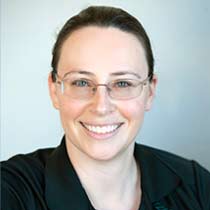Dr. Rachel Knight

Hi Dr. Rachel, welcome to Ashland.
Can you start by telling us about your first experiences with therapeutic bodywork?
As a youth, I was a competitive athlete. I did ballet and gymnastics from age 4 to 12. In junior high I moved on to wrestling and soccer and continued both sports through high school, college and chiropractic school. Of course, I injured many different parts of my body and spent much of my athletic career healing from one thing or another. I was lucky that my parents took me to good hands on practitioners.
My first experience with therapeutic body work was as a patient, starting at age nine, having massage treatments for my athletic injuries. At age ten, I saw my first chiropractor, when I fell head first on a trampoline, and injured my neck. Throughout my life I have never been without bodyworkers as part of my health team.
When did you begin to learn to apply your experience and skills to others?
My first clinical experiences, in high school, involved studying with my massage therapist, Bob Wagner, LMT, in Etna, California. He encouraged
me to go on to further professional studies. My next clinical experience was during my college undergraduate student years, at College of the Siskiyous, where I worked in the Athletic Training Facilities, helping treat injured athletes.
Where did you complete your clinical training?
Clinical training is never complete. I did graduate with my doctorate in chiropractic from University of Western States in Portland in 2012. My last quarter, I interned with Dr. Marc and Dr. Matt, and hoped that I could one day join them. My first chiropractic practice was as an associate in San Rafael and then I opened my own practice in Davis, California. When you add it all up, I have been studying soft tissue treatment methods for twenty of my thirty-five years.
Do you continue to study and develop your skills?
I am an avid learner (or maybe you could call me a nerd) in the musculo-skeletal field; I continue to improve my expertise by reading, listening to podcasts, watching videos, and taking classes. There is so much wonderful information available these days. I keep finding new to me and interesting ways to help people heal and deal with the side effects of being an active human.
You talk about a soft tissue focus. What does that mean?
Soft tissue in my mind includes pretty much everything besides our bones. My personal clinical focus would be fascial tissue, muscles, tendons and ligaments. I look at these structures from a multitude of angles such as how they feel and move under my hands, what is their texture, does the tissue feel hard indicating it may be lacking fluid or extra soft indicating that it’s holding too much fluid (edema). What does the tissue we are addressing do when stretched or challenged?
Next, based on what I find the question becomes why? Why is it this way and how do we fix it long term. How all our tissues function directly relates to not only pain, but also how the joints move and function in daily life.
Tell us more about your unique approach.
My chiropractic approach emphasizes various types of soft tissue release methods, as well as low force, non-thrust manipulation.
I am full body ART (Active Release Technique) certified, which is a very extensive training, and a very powerful soft tissue tool. I am also trained in Graston Technique, Myofascial Decompression using suction cups, and muscle energy technique. I have been fortunate to have used pulsewave, also known as acoustic compression therapy, for over seven years. I have developed my skills with this unique noninvasive regenerative method. I have had extensive experience with addressing soft tissue, including fascia, tendons, ligaments, and muscles.
Do you have a specialty?
Yes and no. I am still young, and have a lot of clinical interests. I do love evaluating and treating shoulder problems; that complex of joints always gives me a challenge. I treated a lot of shoulders in Davis, where I saw many Masters swimmers. The jaw and TMJ/TMD area is another interest of mine.
I actually love to treat patients with chronic, severe problems. I get such pleasure from helping people who have not gotten helped elsewhere.
Do you use a particular technique approach?
I look at each person’s problems very individually. This is especially important with chronic pain. I attempt to be creative in solving pain problems as quickly and thoroughly as possible. I actually really like getting patients to a place where they do not need me to help them and can feel empowered to keep themselves moving and healthy.
Are you still involved in your own athletic activities?
Of course. I gave up wrestling in early college after a severe head injury and soccer after my 3rd hamstring tear in the same leg. Now I hike (my favorite), paddle board, kayak and ride motorcycles to high peaks to get the best views!
